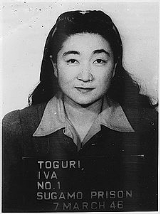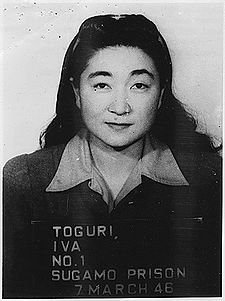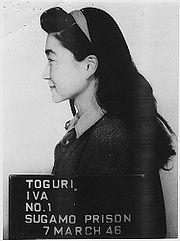
Tokyo Rose
Encyclopedia

Allies of World War II
The Allies of World War II were the countries that opposed the Axis powers during the Second World War . Former Axis states contributing to the Allied victory are not considered Allied states...
forces in the South Pacific
Pacific Ocean
The Pacific Ocean is the largest of the Earth's oceanic divisions. It extends from the Arctic in the north to the Southern Ocean in the south, bounded by Asia and Australia in the west, and the Americas in the east.At 165.2 million square kilometres in area, this largest division of the World...
during World War II
World War II
World War II, or the Second World War , was a global conflict lasting from 1939 to 1945, involving most of the world's nations—including all of the great powers—eventually forming two opposing military alliances: the Allies and the Axis...
to any of approximately a dozen English
English language
English is a West Germanic language that arose in the Anglo-Saxon kingdoms of England and spread into what was to become south-east Scotland under the influence of the Anglian medieval kingdom of Northumbria...
-speaking female broadcasters of Japan
Japan
Japan is an island nation in East Asia. Located in the Pacific Ocean, it lies to the east of the Sea of Japan, China, North Korea, South Korea and Russia, stretching from the Sea of Okhotsk in the north to the East China Sea and Taiwan in the south...
ese propaganda
Propaganda
Propaganda is a form of communication that is aimed at influencing the attitude of a community toward some cause or position so as to benefit oneself or one's group....
. The intent of these broadcasts was to disrupt the morale
Morale
Morale, also known as esprit de corps when discussing the morale of a group, is an intangible term used to describe the capacity of people to maintain belief in an institution or a goal, or even in oneself and others...
of Allied forces listening to the broadcast. American servicemen in the Pacific often listened to the propaganda broadcasts to get a sense, by reading between the lines, of the effect of their military actions. Farther from the action, stories circulated that Tokyo Rose could be unnervingly accurate, naming units and even individual servicemen; though such stories have never been substantiated by documents such as scripts and recorded broadcasts, they have been reflected in popular books and films such as Flags of Our Fathers
Flags of Our Fathers (film)
is a 2006 American war film directed, co-produced and scored by Clint Eastwood and written by William Broyles, Jr. and Paul Haggis. It is based on the book of the same name written by James Bradley and Ron Powers about the Battle of Iwo Jima, the five Marines and one Navy Corpsman who were involved...
. Similar rumors surround the propaganda broadcasts of Lord Haw-Haw
Lord Haw-Haw
Lord Haw-Haw was the nickname of several announcers on the English-language propaganda radio programme Germany Calling, broadcast by Nazi German radio to audiences in Great Britain on the medium wave station Reichssender Hamburg and by shortwave to the United States...
and Axis Sally.
Iva Toguri D'Aquino
The name "Tokyo Rose" is most strongly associated with Iva Toguri D'AquinoIva Toguri D'Aquino
Iva Ikuko Toguri D'Aquino , was an American citizen who participated in English-language propaganda broadcast transmitted by Radio Tokyo to Allied soldiers in the South Pacific during World War II...
. D'Aquino broadcast as "Orphan Ann" during the 15-20 minute D.J.
Disc jockey
A disc jockey, also known as DJ, is a person who selects and plays recorded music for an audience. Originally, "disc" referred to phonograph records, not the later Compact Discs. Today, the term includes all forms of music playback, no matter the medium.There are several types of disc jockeys...
segment of the 75-minute program The Zero Hour on Radio Tokyo (NHK). The program consisted of propaganda-tinged skits and slanted news reports as well as popular American music.
Toguri was detained for a year by the U.S. military before being released for lack of evidence. Department of Justice officials agreed that her broadcasts were "innocuous". But when Toguri tried to return to the US, a popular uproar ensued, prompting the Federal Bureau of Investigation to renew its investigation of Toguri's wartime activities. Her 1949 trial resulted in a conviction on one of eight counts of treason. In 1974, investigative journalists found that key witnesses claimed they were forced to lie during testimony. Toguri was pardoned by U.S. President Gerald Ford in 1977.
Others
Toguri's advocates have long argued that other announcers better suited the legend. These include the American Ruth Hayakawa (who substituted for Iva on weekends), Canadian June Suyama ("The Nightingale of Nanking"), who also broadcast on Radio Tokyo, and Myrtle Lipton ("Little Margie") who broadcast from Japanese-controlled Radio Manila. However, during the war, journalists and officials with the US Foreign Broadcast Information ServiceForeign Broadcast Information Service
Foreign Broadcast Information Service was an open source intelligence component of the Central Intelligence Agency's Directorate of Science and Technology. It monitored, translated, and disseminated within the U.S. government openly available news and information from media sources outside the...
identified Toguri's "Orphan Ann" as the woman "most servicemen seem to refer to when they speak of Tokyo Rose" but characterized the "legends" of clairvoyance that "piled up about 'Tokyo Rose'" as "apocryphal".
Tokyo Mose
Walter KanerWalter Kaner
Walter Kaner was an American journalist and philanthropist.-Early life:Kaner was born in New York City, one of three children of Philip and Ida Kaner. He grew up in New York City.-Career in Journalism:...
aired on US Army Radio during and after World War II as "Tokyo Mose", answering Tokyo Rose’s broadcasts. In Japan, his "Moshi, Moshi Ano-ne" theme song, sung to the tune of "London Bridge is Falling Down
London Bridge is Falling Down
"London Bridge Is Falling Down" is a well-known traditional nursery rhyme and singing game, which is found in different versions all over the world. It has a Roud Folk Song Index number of 502.-Lyrics:...
", was so popular with Japanese children and GIs alike that Stars and Stripes
Stars and Stripes (newspaper)
Stars and Stripes is a news source that operates from inside the United States Department of Defense but is editorially separate from it. The First Amendment protection which Stars and Stripes enjoys is safeguarded by Congress to whom an independent ombudsman, who serves the readers' interests,...
, the Army newspaper, called it "the Japanese occupation theme song." Elsa Maxwell
Elsa Maxwell
Elsa Maxwell was an American gossip columnist and author, songwriter, and professional hostess renowned for her parties for royalty and high society figures of her day....
's column and radio show in 1946 referred to Kaner as "the breath of home to unknown thousands of our young men when they were lonely."
In popular culture
Tokyo Rose has been the subject of song, movies and documentaries:
- 1945: Tokyo Woes, propaganda cartoon directed by Bob ClampettBob ClampettRobert Emerson "Bob" Clampett was an American animator, producer, director, and puppeteer best known for his work on the Looney Tunes animated series from Warner Bros., and the television shows Time for Beany and Beany and Cecil...
. The cartoon's titular character (voiced by an uncredited Sara Berner) is portrayed as an overly enthusiastic, buck-toothed Japanese woman speaking on a propaganda broadcast with a loud voice and an American accent. - 1946: Tokyo Rose, film; directed by Lew LandersLew LandersLew Landers was a prolific American film and television director.-Biography:Born Louis Friedlander in New York City, he began his movie career as an actor. In 1914 he appeared in two features, D. W. Griffith's The Escape and the comedy short Admission -- Two Pins, opposite Glen White, under his...
. Lotus LongLotus LongBorn Lotus Pearl Shibata in New Jersey, Lotus Long was an American actor born to a father of Japanese ancestry and a mother of Hawai'ian ancestry. She came to Southern California during the 1920s to act in Hollywood films, and usually portrayed ethnic Asian female characters in supporting roles. ...
played a heavily fictionalized "Tokyo Rose", described on the film's posters as a "seductive jap traitress"; Byron BarrByron BarrByron Barr sometimes billed as Byron S. Barr, was an American actor born in Corning, Iowa.Barr was in 17 films in his career. He is perhaps best known for his role as Nino Zachetti in Double Indemnity, his first appearance...
played the G.I. protagonist, set to kidnap the Japanese announcer. Blake EdwardsBlake EdwardsBlake Edwards was an American film director, screenwriter and producer.Edwards' career began in the 1940s as an actor, but he soon turned to writing radio scripts at Columbia Pictures...
appeared in a supporting part. - 1969: The Story of "Tokyo Rose", CBS-TV and WGN radio documentary written and produced by Bill KurtisBill KurtisBill Kurtis is an American television journalist, producer, narrator, and news anchor. He is also the current host of A&E crime and news documentary shows, including Investigative Reports, American Justice, and Cold Case Files...
. - 1976: Tokyo Rose, CBS-TV documentary segment on 60 Minutes60 Minutes60 Minutes is an American television news magazine, which has run on CBS since 1968. The program was created by producer Don Hewitt who set it apart by using a unique style of reporter-centered investigation....
by Morley SaferMorley SaferMorley Safer is a Canadian reporter and correspondent for CBS News. He is best known for his long tenure on the newsmagazine 60 Minutes, which began in December 1970.-Life and career:...
, produced by Imrel Harvath. - 1987: American heavy metalHeavy metal musicHeavy metal is a genre of rock music that developed in the late 1960s and early 1970s, largely in the Midlands of the United Kingdom and the United States...
band Shok Paris released the song Tokyo Rose on their 1987 album Steel and Starlight. It's about a lonely GI who fell in love with the propaganda broadcaster during the war, and remembers her voice many years later. http://www.youtube.com/watch?v=1ddZTPsK6jM - 1995: Tokyo Rose: Victim of Propaganda, A&E Biography documentary, hosted by Peter GravesPeter Graves (actor)Peter Aurness , known professionally as Peter Graves, was an American film and television actor. He was best known for his starring role in the CBS television series Mission: Impossible from 1967 to 1973...
, available on VHS (AAE-14023). - 2008: Tokyo Rose, film; in development with Darkwoods Productions, the only entity granted life story rights by Iva Toguri, Frank DarabontFrank DarabontFrank Darabont is a Hungarian-American film director, screenwriter and producer who has been nominated for three Academy Awards and a Golden Globe. He has directed the films The Shawshank Redemption, The Green Mile, and The Mist, all based on stories by Stephen King...
to direct. Christopher HamptonChristopher HamptonChristopher James Hampton CBE, FRSL is a British playwright, screen writer and film director. He is best known for his play based on the novel Les Liaisons dangereuses and the film version Dangerous Liaisons and also more recently for writing the nominated screenplay for the film adaptation of...
is the screenwriter for Tokyo Rose.
In 2004, actor George Takei
George Takei
George Hosato Takei Altman is an American actor, author, social activist and former civil politician. He is best known for his role in the television series Star Trek and its film spinoffs, in which he played Hikaru Sulu, helmsman of the...
announced he was working on a film entitled Tokyo Rose, American Patriot, about Toguri's activities during the war.
External links
- Obituary
- Tokyo Rose: They Called Her a Traitor article by J. Kingston Pierce
- The Legend of Tokyo Rose book chapter by Ann Elizabeth Pfau
- Adam Carolla Interview with George Takei Extended Discussion about Tokyo Rose
- Archive.org audio files of a full Tokyo Rose broadcast and several examples of her sign-off.

